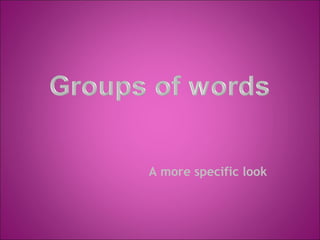
Groups specific
- 1. A more specific look
- 2. 3 filters? general vs. Specific (basic/ simple) (advanced/ complex) common vs. uncommon informal vs. formal
- 3. Vocabulary groups (noun, verb, adjective, adverb) Noun + noun Verb + noun Adjective + noun Adverb + adjective Verb + adverb Verb + verb
- 4. Vocabulary groups (noun, verb, adjective, adverb) Noun + noun (a police chief) Verb + noun (to go home) Adjective + noun (a fast car) Adverb + adjective (absolutely amazing) Verb + adverb (run slowly) Verb + verb (have to go)
- 5. He is incredible He is incredibly strong He is going to ask her to dance He is intending on asking her to dance
- 6. Grammar Any sentence/ sentences which can be manipulated into other circumstances (normally nouns/verbs/adjective/adverbs can be substituted out)
- 7. • Not only + (aux) + (subject) + (verb), but +(subject) also + (verb) • Not only does he enjoy cooking, but he is also fond of eating out with friends • Not only is she studying for exams, but she is also working part-time • Not only have I finished collage, but I have also finished my internship.
- 8. A French student I'm sick and tired of my sister due to the fact that she manages to take all my clothes. It's very annoying, but it's even more boring when I want to dress me up with a t-shirt or a trouser that she "stole" me. I am in desperate need of help because she never asks me permission to take my clothes so I don't know what to do. I'm thinking of locking my room but it isn't the best solution. It looks hopeless. My sister as stubborn as a donkey.
- 9. A French student I'm sick and tired of my sister due to the fact that she manages to take all my clothes. It's very annoying, but it's even more boring when I want to dress me up with a t-shirt or a trouser that she "stole" me. I am in desperate need of help because she never asks me permission to take my clothes so I don't know what to do. I'm thinking of locking my room but it isn't the best solution. It looks hopeless. My sister as stubborn as a donkey.
- 10. Not only am I going to (verb) but I’m also going to (verb) Go to (place) Due to the fact that + Subject Verb Object Owing to the fact that + Subject Verb Object To be sick and tired of (noun/gerund) To meet friends Manage to (verb)
- 11. Have a great day!!